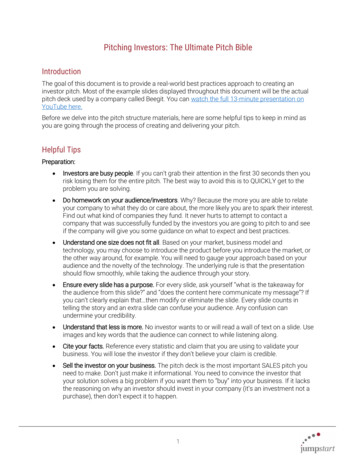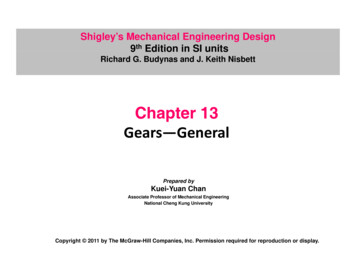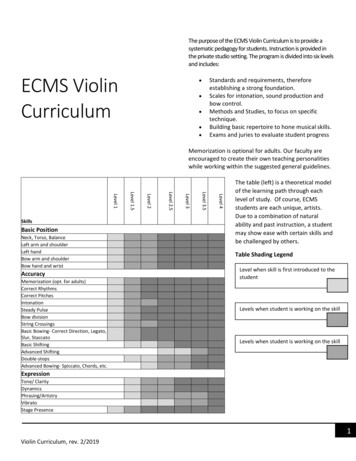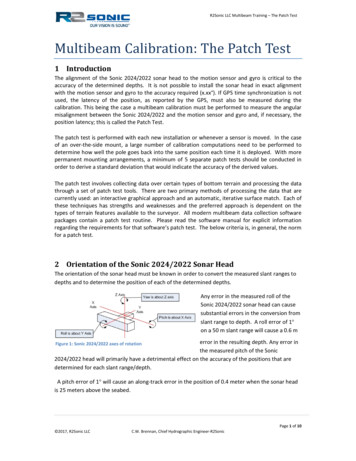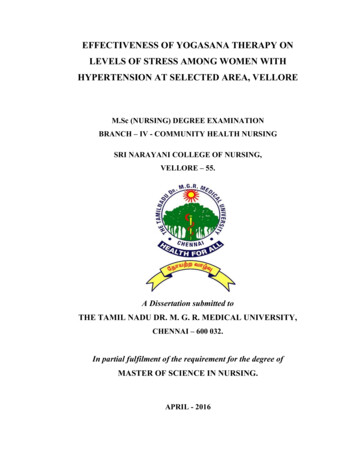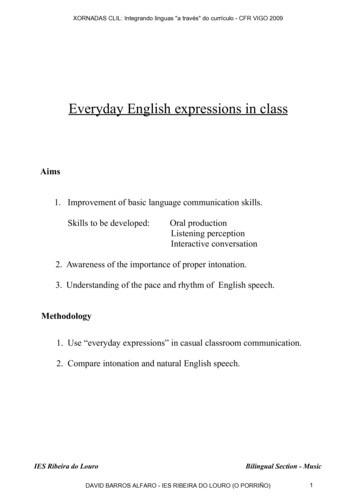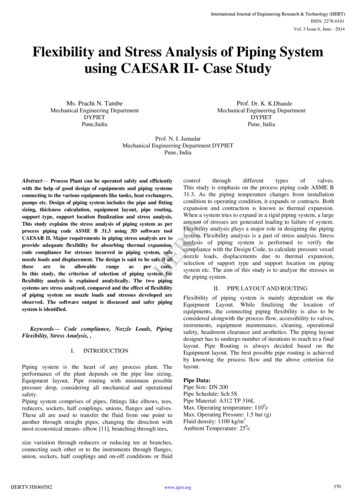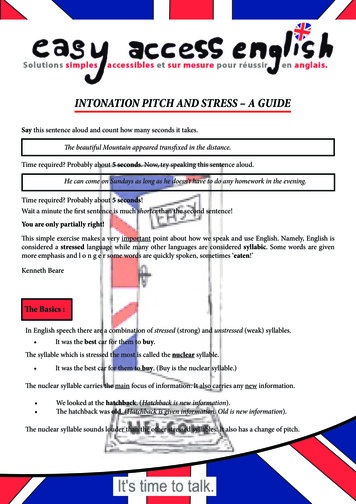
Transcription
INTONATION PITCH AND STRESS – A GUIDESay this sentence aloud and count how many seconds it takes.The beautiful Mountain appeared transfixed in the distance.Time required? Probably about 5 seconds. Now, try speaking this sentence aloud.He can come on Sundays as long as he doesn’t have to do any homework in the evening.Time required? Probably about 5 seconds!Wait a minute the first sentence is much shorter than the second sentence!You are only partially right!This simple exercise makes a very important point about how we speak and use English. Namely, English isconsidered a stressed language while many other languages are considered syllabic. Some words are givenmore emphasis and l o n g e r some words are quickly spoken, sometimes ‘eaten!’Kenneth BeareThe Basics :In English speech there are a combination of stressed (strong) and unstressed (weak) syllables. It was the best car for them to buy.The syllable which is stressed the most is called the nuclear syllable. It was the best car for them to buy. (Buy is the nuclear syllable.)The nuclear syllable carries the main focus of information. It also carries any new information. We looked at the hatchback. (Hatchback is new information).The hatchback was old. (Hatchback is given information. Old is new information).The nuclear syllable sounds louder than the other stressed syllables. It also has a change of pitch.
Pitch movements :The two most common pitch movements are:1.2.rising pitch yésfalling pitch yèsCompare these replies:Q: When would it suit you to come?A: Nów?(The intonation expresses a question : would it be OK if I came now?)Q: When would it suit you to come?A: Nòw.(The intonation expresses a statement : I'll come now.)A falling tone is used to show completeness. A falling tone is normally used when a person is about to stoptalking. A falling tone is used at the end of a list to show that the list is complete. Would you like tea / coffee / fruit juice / or lemonade / (That's all I'm offering.)A rising tone can indicate incompleteness. A rising tone at the end indicates that they wish to continue speaking and are seeking feedback, by word or gesture.What is intonation ?Intonation shows the speaker's attitude. It is by changing the pitch that we can indicate certainty, uncertainty,enthusiasm, boredom, and so on. We can say "yes" so that it almost means "no".As listeners, we become skilled at detecting fine shades of meaning in other people's speech. We can say theysounded unhappy, tired, sneering, self-satisfied, sarcastic, and so on. These attitudes are picked up from veryfine variations in pitch and loudness.Although intonation is an important feature of spoken English, it is represented in written English only rathercrudely by the use of such punctuation devices as full stops, commas, question marks, and exclamation marks.Skilful writers can convey shades of meaning in various ways. Some resort to a simple method of adverbials.e.g. "How are you today?" he asked cheerfully.
Intonation - Stress TypesImproving sentence intonation is one of the key elements in your English pronunciation. Let's discussthe four basic types of word stress that lead to proper intonation in English.Tonic stressEmphatic stressContrastive stressNew information stressTONIC STRESSTonic stress refers to the syllable in a word which receives the most stress in an intonation unit. An intonationunit has one tonic stress. It's important to remember that a sentence can have more than one intonation unit,and therefore have more than one tonic stress. Here are some examples of intonation units with the tonic stressbolded.He's waitingHe's waiting / for his friendHe's waiting / for his friend / at the station.Generally, the final tonic stress in a sentence receives the most stress. In the above example, 'station' receivesthe strongest stress.There are a number of instances in which the stress changes from this standard.Here are short explanations for each of the changes with example sentences to illustrate.EMPHATIC STRESSIf you decide to emphasize something, you can change the stress from the principal noun to another contentword such as an adjective (big, difficult, etc.), intensifier (very, extremely, etc.) This emphasis calls attention tothe extraordinary nature of what you want to emphasize.For example:That was a difficult test.- Standard statementThat was a difficult test.- Emphasizes how difficult the test .
CONTRASTIVE STRESSContrastive stress is used to point out the difference between one object and another. It tends to be used withdeterminers such as 'this, that, these and those'.For example : I think I prefer this colour. Do you want these or those curtains?Contrastive stress is also used to bring out a given word in a sentence, which will also slightly change themeaning. He came to the party yesterday. (It was he, not someone else). He walked to the party yesterday. (He walked rather than drove). He came to the party yesterday. (It was a party not a meeting or something else). He came to the party yesterday. (It was yesterday not two weeks ago or some other time).NEW INFORMATION STRESSWhen asked a question, the requested information is naturally stressed more strongly.For example :Where are you from? - I come from Seattle, in the USA.What do you want to do? - I want to go bowling.When does class begin? - The class begins at nine o'clock.
ENGLISH IS A STRESS BASED LANGUAGEEnglish is considered astressed language while many otherlanguages are considered syllabic .So, what does this mean whenyou speak?What does that mean?Well, first you need to understand which words we stress.It means that, in English, we givestress to certain words while otherwords are quickly spoken (eaten!). InFrench each syllable receives equalimportance and therefore equal timeis needed. English however, spendsmore time on specific stressed wordswhile quickly gliding over the other,less important, words.Let's look at an example:The modal verb "can".When we use the positive form of"can" we quickly glide over the canand it is hardly pronounced.1We can meet here.But when we use the negative form"can't" we tend stress the fact that itis negative.2We can’t meet here.Sentence 2 is longer.Stress words are :CONTENT words: Nouns Principal verbs Adjectives AdverbsNon-stressed words are :FUNCTION words: Determiners Auxiliary verbs Prepositions Conjunctions PronounsYou needn't worry about pronouncing every word clearlyto be understood (we nativespeakers certainly don't). Youshould however, concentrateon pronouncing the stressedwords clearly.We concentrate on the stressedwords rather than giving importance to each syllable. so listen for(and use in speaking) the stressedwords. All those words that youthought you didn't understand arereally not crucial for understanding the sense or making yourselfunderstood. Stressed words are thekey to excellent pronunciation andunderstanding of English.Kenneth Beare
Word StressAll words of more than one syllable have what is called word stress. This means that at least one of the syllablesis l o n g e r and louder than the other syllables.In the following examples, stressed syllables are in CAPITAL hyphotoGRAphicvolunTEErsoCIetyinforMAtionIn many cases, word stress must simply be learned as new vocabulary is acquired. However, there are severalrules for word stress which can make it easier to deal with.I.COMPOUND keyboardIn each of these examples, the first part of the compound gets the stress.II.NOUN NOUN COMPOUNDS(2-word compound nouns)air conditionercomputer programmernail polishfrench fryGeiger counterdoctor's officeThe first word gets the stress.(Note: If the "unstressed" part of the noun noun compound is more than one syllable, it will have some wordstress. However, the first part of the compound will get even more stress.)
III.PHRASAL VERBSversus Compound Nouns derived from phrasalsPhrasal verbs (a.k.a. two-word or two-part verbs) are generally made up of a verb and preposition. For manyof these, correct word stress is especially important as they have compound noun counterparts.In phrasal verbs, the prepositiongets the word stress. In the compounnouns however the stress is on thefirst part.IV.Phrasal VerbsCompound Nounslet downletdownshut outshutoutturn offturnofftake overtakeoverprint outprintoutHOMOGRAPHSHomographs are words which are written the same way but which have different pronunciation.In English, there are many words which have the same spelling, but with different word stress the meaningcan change. The vowel sounds change depending on whether they are stressed or unstressed.VERBrecordprogresspresentpermitBy Kenneth BEARENOUNrecordprogresspresentpermit
INTONATION PITCH AND STRESS – A GUIDE Say this sentence aloud and count how many seconds it takes. The beautiful Mountain appeared transfixed in the distance. Time required? Probab

